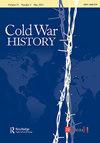Word war during Patrick Hurley’s 1944 mission to China
IF 0.3
2区 历史学
Q1 HISTORY
引用次数: 0
Abstract
ABSTRACT This article explores the disparities that exist between the original English versions and the translated Chinese versions of Patrick Hurley’s ‘Five-Point Proposal’ and argues that by studying additional primary sources, these differences can reveal insights into the political manoeuvring of both parties on the verge of the Cold War and their efforts to mould their own historical accounts. By analysing all available versions of the proposal, the article examines two primary sets of textual discrepancies and their potential implications for interpreting the motives of the Kuomintang (KMT) and the Chinese Communist Party (CCP). The analysis emphasises the importance of taking into account the translation process and the translators’ contributions to creating these disparities.1944年,帕特里克·赫尔利(Patrick Hurley)前往中国执行任务期间,发生了世界大战
本文章由计算机程序翻译,如有差异,请以英文原文为准。
求助全文
约1分钟内获得全文
求助全文

 求助内容:
求助内容: 应助结果提醒方式:
应助结果提醒方式:


